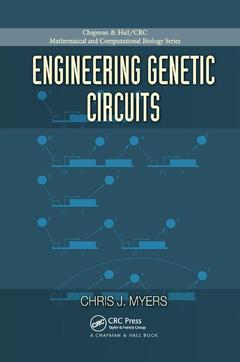Engineering Genetic Circuits Chapman & Hall/CRC Computational Biology Series
Auteur : Myers Chris J.

An Introduction to Systems Bioengineering
Takes a Clear and Systematic Engineering Approach to Systems Biology
Focusing on genetic regulatory networks, Engineering Genetic Circuits presents the modeling, analysis, and design methods for systems biology. It discusses how to examine experimental data to learn about mathematical models, develop efficient abstraction and simulation methods to analyze these models, and use analytical methods to guide the design of new circuits.
After reviewing the basic molecular biology and biochemistry principles needed to understand genetic circuits, the book describes modern experimental techniques and methods for discovering genetic circuit models from the data generated by experiments. The next four chapters present state-of-the-art methods for analyzing these genetic circuit models. The final chapter explores how researchers are beginning to use analytical methods to design synthetic genetic circuits.
This text clearly shows how the success of systems biology depends on collaborations between engineers and biologists. From biomolecular observations to mathematical models to circuit design, it provides essential information on genetic circuits and engineering techniques that can be used to study biological systems.
An Engineer’s Guide to Genetic Circuits. Learning Models. Differential Equation Analysis. Stochastic Analysis. Reaction-Based Abstraction. Logical Abstraction. Genetic Circuit Design. Solutions to Selected Problems. References. Glossary. Index.
Chris J. Myers is a professor in the Department of Electrical and Computer Engineering at the University of Utah. A co-inventor on four patents and author of more than 80 technical papers and the textbook Asynchronous Circuit Design, Dr. Myers received an NSF Fellowship in 1991 and an NSF CAREER award in 1996. His research interests include formal verification, asynchronous circuit design, and the analysis and design of genetic regulatory circuits.
Date de parution : 09-2018
15.6x23.4 cm
Date de parution : 07-2009
Ouvrage de 280 p.
15.6x23.4 cm
Thèmes d’Engineering Genetic Circuits :
Mots-clés :
Genetic Circuits; GFP Level; decision; National Human Genome Research Institute; stochastic; Chemical Reaction Network Model; simulation; Ode Model; chemical; CI Production; reaction; CI CII; network; Reaction Rate Equations; model; Print Interval; transcription; Influence Vector; factor; Euler Simulation; rate; Gene cIII; Bayesian Network; PR Promoter; Equilibrium Point; cI Gene; Euler’s Method; Propensity Function; RNAP Bind; Dimerization Reduction; Bifurcation Diagram; Bin Assignment; Genome Wide Location Analysis; PPP PPP; NAND Gate


